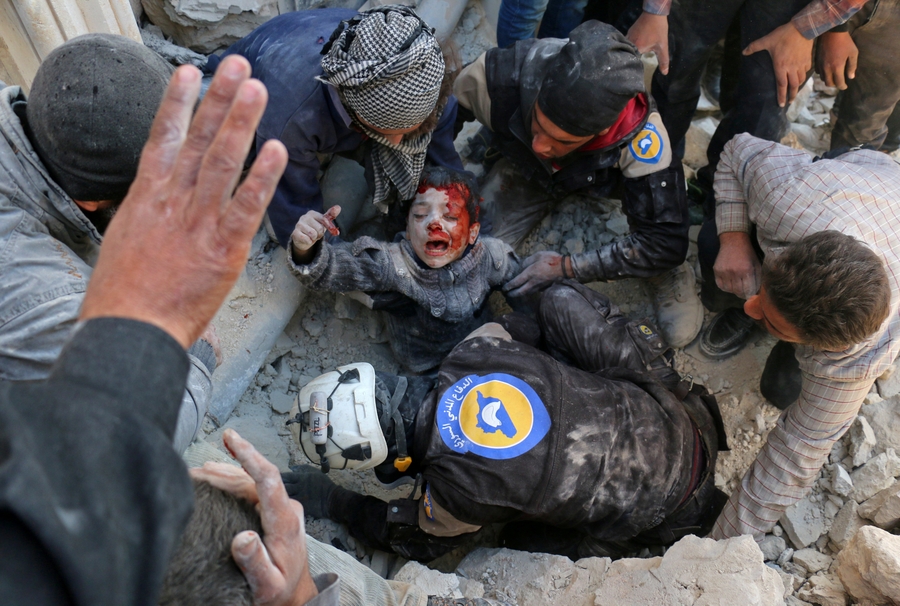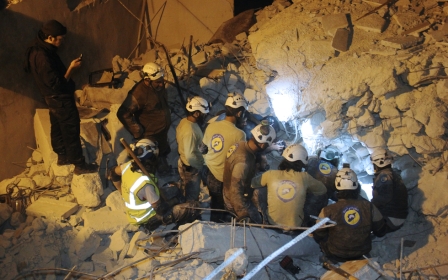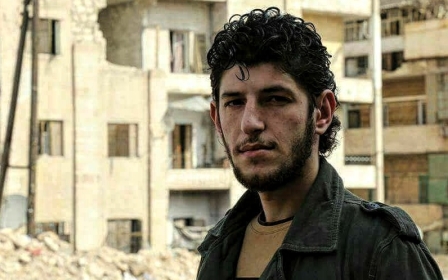White Helmet volunteers save child in Idlib as group wins Oscar

Syria's White Helmets say volunteer rescuers on the ground were saving a child in Idlib at the moment when a short documentary about the group's work won an Oscar.
An image posted on the group's social media page showed volunteers from its branch in rebel-held Idlib pulling a child out of rubble following a reported Syrian government air strike early on Monday morning local time.
The child was pulled alive from rubble in the Ariha area of Idlib, but rescue teams continued to search for missing civilians trapped following the bombing.
Describing the saving of the child as a "real win," the group also said it was an "honour" that Netflix feature film won in the "Best Short Documentary" category at the Oscars ceremony in Hollywood on Sunday night.
The group also posted a picture showing White Helmet volunteers hugging each other after its rescue centre was targeted by a suspected Syrian government air strike.
Filmmakers Joanna Natasegara and Orlando Von Einsiedel, who directed the short documentary, thanked the White Helmets in their acceptance speech.
"It's very easy for these guys to feel they're forgotten...this war's been going on for six years," Von Einsiedel said, urging attendees at the prestigious ceremony to "stand up and remind the White Helmets that we all care".
Einsiedel also read out a statement from Raed Saleh, the head of the White Helmets.
Saleh had managed to obtain a visa to enter the US, but declined an invitation to the ceremony citing an increased workload due to intense bombardment of rebel-held areas by the Syrian government.
"I won't travel to OSCAR due to the intensity of work, our priority is helping our people," Saleh had tweeted in English.
White Helmet volunteer denied entry despite having valid visa
However, fellow White Helmet Khaled Khatib, whose work features prominently in the film, was denied entry to the United States after the Department of Homeland Security said it had discovered "derogatory information" about him.
Khatib was stuck in Istanbul airport for three days before being told by Turkish authorities that he would need a passport waiver to allow him entry into the US.
A Department of Homeland Security spokesperson said only that “a valid travel document is required for travel to the United States,” declining to provide further information.
In a statement online, Khatib said he was "delighted that we won an Oscar - it shows us that people care about us and the people we serve."
The two rescuers had feared they could be barred from attending the ceremony because of US President Donald Trump's executive order in late January that banned entry to citizens of seven Muslim-majority countries, including Syria.
The ban has since been lifted by a US federal court, and both Khalid and Saleh received their visas to attend the ceremony in Hollywood.
According to statistics compiled by the White Helmets, volunteer rescuers have saved over 85,000 civilians since the group's inception in 2013.
It currently has over 3,000 volunteers conducting rescue missions across rebel-held parts of Syria.
The group, which missed out on winning the Nobel Peace Prize last year, has also been targeted repeatedly by militias and groups loyal to the Syrian government.
New MEE newsletter: Jerusalem Dispatch
Sign up to get the latest insights and analysis on Israel-Palestine, alongside Turkey Unpacked and other MEE newsletters
Middle East Eye delivers independent and unrivalled coverage and analysis of the Middle East, North Africa and beyond. To learn more about republishing this content and the associated fees, please fill out this form. More about MEE can be found here.




